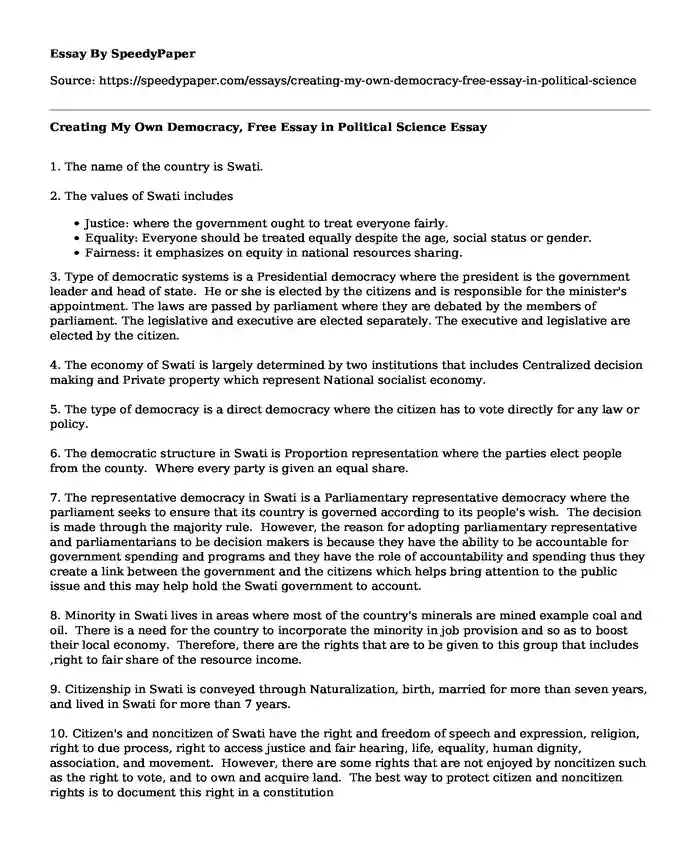
| Type of paper: | Article review |
| Categories: | Political science Democracy |
| Pages: | 3 |
| Wordcount: | 585 words |
2. The values of Swati includes
- Justice: where the government ought to treat everyone fairly.
- Equality: Everyone should be treated equally despite the age, social status or gender.
- Fairness: it emphasizes on equity in national resources sharing.
4. The economy of Swati is largely determined by two institutions that includes Centralized decision making and Private property which represent National socialist economy.
5. The type of democracy is a direct democracy where the citizen has to vote directly for any law or policy.
6. The democratic structure in Swati is Proportion representation where the parties elect people from the county. Where every party is given an equal share.
7. The representative democracy in Swati is a Parliamentary representative democracy where the parliament seeks to ensure that its country is governed according to its people's wish. The decision is made through the majority rule. However, the reason for adopting parliamentary representative and parliamentarians to be decision makers is because they have the ability to be accountable for government spending and programs and they have the role of accountability and spending thus they create a link between the government and the citizens which helps bring attention to the public issue and this may help hold the Swati government to account.
8. Minority in Swati lives in areas where most of the country's minerals are mined example coal and oil. There is a need for the country to incorporate the minority in job provision and so as to boost their local economy. Therefore, there are the rights that are to be given to this group that includes ,right to fair share of the resource income.
9. Citizenship in Swati is conveyed through Naturalization, birth, married for more than seven years, and lived in Swati for more than 7 years.
10. Citizen's and noncitizen of Swati have the right and freedom of speech and expression, religion, right to due process, right to access justice and fair hearing, life, equality, human dignity, association, and movement. However, there are some rights that are not enjoyed by noncitizen such as the right to vote, and to own and acquire land. The best way to protect citizen and noncitizen rights is to document this right in a constitution
11. The obligation of citizenship in Swati includes:
Voting - when a citizen is above the age of 18 it is an obligation for one to elect a leader of choice.
Hold leader to account. It is an obligation for Swati citizen to ensure they elect leaders that are conducting responsively and working properly according to the constitution. The citizen has the power to recall a leader in case of poor conduct with a valid reason.
Protect the environment. The constitution of Swati gives its citizens the right to healthy and clean environment and indi9cates that every citizen has a role and is responsible to protect the environment. This is by ensuring that the public and private surrounding is clean and is protected from pollution, littering and planting trees and nurturing them.
Cite this page
Creating My Own Democracy, Free Essay in Political Science. (2022, Mar 01). Retrieved from https://speedypaper.com/essays/creating-my-own-democracy-free-essay-in-political-science
Request Removal
If you are the original author of this essay and no longer wish to have it published on the SpeedyPaper website, please click below to request its removal:
- Free Essay Sample: Language and Thought
- Biology Essay Sample: Metamorphosis as a Biological Process
- Essay Example about African Traditions
- Free Essay on Short-term and Long-term Professional Goals
- Health Management Challenges, Essay Sample for Students
- Essay Analysis: 'No Need to Call', Free Example
- Anne Bradstreet - To My Dear and Loving Husband, Poetry Analysis Essay Sample
Popular categories




